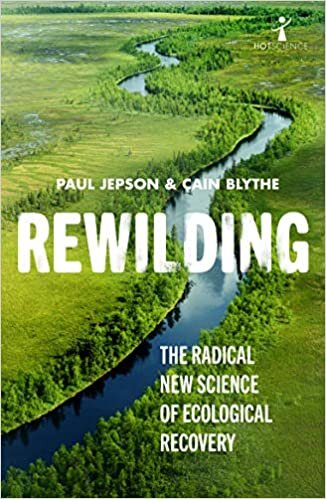Rewilding: The Radical New Science of Ecological Recovery - Paul Jepson, Cain Blythe
Rewilding is the first popular book on the ground-breaking science behind the restoration of wild nature.
As ecologists Paul Jepson and Cain Blythe show, rewilding is a new and progressive approach to conservation, blending radical scientific insights with practical innovations to revive ecological processes, benefiting people as well as nature. Its goal is to restore lost interactions between animals, plants and natural disturbance that are the essence of thriving ecosystems.
With its sense of hope and purpose, rewilding is breathing new life into the conservation movement, and enabling a growing number of people – even urban-dwellers – to enjoy thrilling wildlife experiences previously accessible only in remote wilderness reserves. ‘De-domesticated’ horses galloping across a Dutch ‘Serengeti’; beavers creating wetlands in the British countryside; giant tortoises restoring the wildlife of the Mauritian islands; perhaps one day even rhinos roaming the Australian outback – rewilding is full of exciting and inspirational possibilities.
Rewilding is the first popular book on the ground-breaking science behind the restoration of wild nature.
As ecologists Paul Jepson and Cain Blythe show, rewilding is a new and progressive approach to conservation, blending radical scientific insights with practical innovations to revive ecological processes, benefiting people as well as nature. Its goal is to restore lost interactions between animals, plants and natural disturbance that are the essence of thriving ecosystems.
With its sense of hope and purpose, rewilding is breathing new life into the conservation movement, and enabling a growing number of people – even urban-dwellers – to enjoy thrilling wildlife experiences previously accessible only in remote wilderness reserves. ‘De-domesticated’ horses galloping across a Dutch ‘Serengeti’; beavers creating wetlands in the British countryside; giant tortoises restoring the wildlife of the Mauritian islands; perhaps one day even rhinos roaming the Australian outback – rewilding is full of exciting and inspirational possibilities.
Rewilding is the first popular book on the ground-breaking science behind the restoration of wild nature.
As ecologists Paul Jepson and Cain Blythe show, rewilding is a new and progressive approach to conservation, blending radical scientific insights with practical innovations to revive ecological processes, benefiting people as well as nature. Its goal is to restore lost interactions between animals, plants and natural disturbance that are the essence of thriving ecosystems.
With its sense of hope and purpose, rewilding is breathing new life into the conservation movement, and enabling a growing number of people – even urban-dwellers – to enjoy thrilling wildlife experiences previously accessible only in remote wilderness reserves. ‘De-domesticated’ horses galloping across a Dutch ‘Serengeti’; beavers creating wetlands in the British countryside; giant tortoises restoring the wildlife of the Mauritian islands; perhaps one day even rhinos roaming the Australian outback – rewilding is full of exciting and inspirational possibilities.






